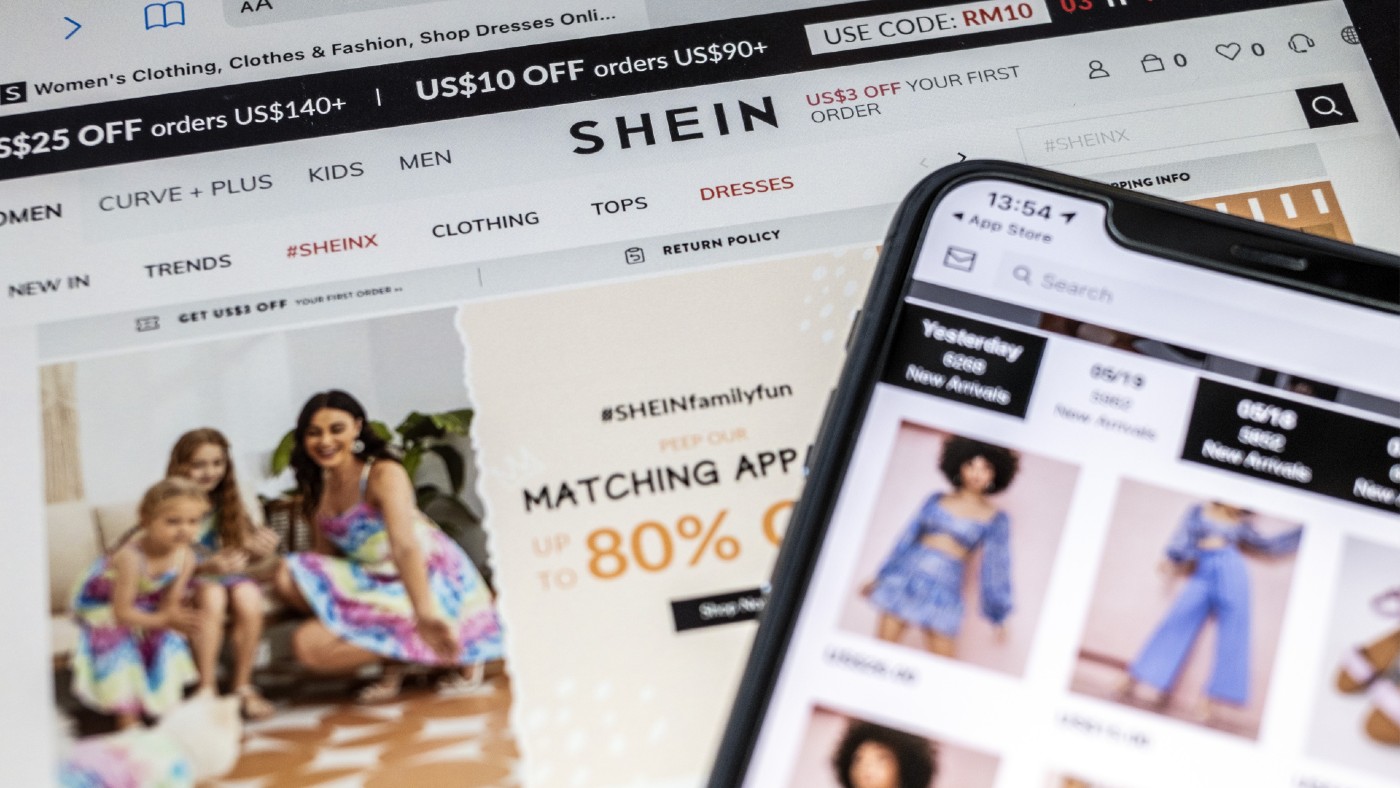Shein: inside China’s e-commerce fashion giant
The brand has gone from ‘low-cost apparel merchant to global juggernaut’ in less than five years

A free daily email with the biggest news stories of the day – and the best features from TheWeek.com
You are now subscribed
Your newsletter sign-up was successful
With a market valuation of around $100bn, online fashion giant Shein is the world’s third most-valuable start-up after Elon Musk’s SpaceX and TikTok’s parent company Bytedance.
The Chinese brand overtook Amazon last year to become the most downloaded shopping app in the US, and “was the second-most popular shopping app globally”, according to e-commerce research company Marketplace Pulse. But sources told Bloomberg that Shein (pronounced she-in) has seen annual sales growth slow from 250% in 2020 to around 60% in 2021.
Unnamed insiders who are not “authorised to speak publicly” reportedly said that the Guangzhou-based e-commerce brand was facing “mounting pressure” to live up to its valuation as the sales growth drop-off continues.
The Week
Escape your echo chamber. Get the facts behind the news, plus analysis from multiple perspectives.

Sign up for The Week's Free Newsletters
From our morning news briefing to a weekly Good News Newsletter, get the best of The Week delivered directly to your inbox.
From our morning news briefing to a weekly Good News Newsletter, get the best of The Week delivered directly to your inbox.
A Shein representative declined to comment.
Covid-19 effect
The Covid-19 pandemic is believed to have turbo-charged Shein’s sales figures in 2020, when millions of customers turned to e-commerce platforms while stuck at home.
“Lockdowns meant that many consumers spent more time browsing online and the fight for brand awareness was taking place across digital platforms,” Richard Lim, chief executive of independent consultancy Retail Economics, told the BBC. “This helped the online retailer grow its presence and reach a wider audience more quickly.”
The fashion giant further raised its profile through initiatives including Shein Together, a four-hour charity event co-headlined by Katy Perry and Lil Nas X that was broadcast on the Shein app in May 2020.
A free daily email with the biggest news stories of the day – and the best features from TheWeek.com
Rapid rise
Shein has risen from “low-cost Chinese apparel merchant to global fashion juggernaut in less than five years”, said Bloomberg. But with origins dating back to 2008, the company took a while to achieve this massive success.
Originally called ZZKKO, the firm was founded by US-born entrepreneur and search engine optimisation specialist Chris Xu (also known as Xu Yangtian). Described by Forbes as “notoriously hard-working”, Xu initially sold wedding dresses to Western customers before acquiring the domain name Sheinside.com in 2012 and branching out into women’s fashion.
In 2015, Xu “renamed the company Shein, focused on overseas markets, and began snapping up fashion rivals”, said the news site.
In June 2021, data analytics company Earnest Research reported that Shein had “overtaken H&M, Zara and Forever 21 as the biggest fast-fashion retailer in the US”.
Shein also ships to more than 150 other countries and regions worldwide.
But, according to Apparel Insider, US consumers’ love affair with Shein may soon be brought to an end by a proposed bill aimed at stopping fast-fashion brands from exploiting “a loophole whereby packages worth less than $800 can enter the US duty-free”.
Shein currently “ships cheap fashion directly to US consumers from its Chinese warehouses, avoiding duty imports in the process”, said the site. And that enables the retailer to sell clothing for a fraction of its rivals’ prices.
Controversies
Shein’s rapid rise had “not been without its problems” even before the US law change was proposed, said Forbes.
In July 2020, the brand came under fire for promoting what Glamour magazine described as “anti-Semitic Nazi paraphernalia”. Shoppers and social media users called for a boycott after the site listed a “metal swastika pendant necklace”.
The company claimed the pendent was a Buddhist symbol, but removed the necklace from sale. In a statement on Instagram, the retailer said it was “so, so sorry” for a “gigantic mistake” that was “hurtful and offensive to so many”.
Just days earlier, Shein had vowed “to do a much better job in educating ourselves” after facing a backlash for selling Muslim prayer mats that were described as “frilled Greek carpets”. The company was “also accused of cultural appropriation for using white models to sell sleepwear that imitated cultural clothing”, the BBC reported.
Allegations of copyright infringement have been made against Shein too, my rival brands including Dr. Martens-maker AirWar International and Ralph Lauren.
Smaller designers have also accused Shein of ripping off their creations. The hashtag #sheinstolemydesign has more than 6.8 million views on TikTok.
New York-based designer Tracy Garcia told Dazed that “one of my followers on Instagram sent me a DM with a link to Shein’s website and when I clicked it I couldn’t believe I was seeing an exact replica of my design”.
A spokesperson told the magazine that Shein “fully respects the intellectual property rights of others” and “promptly takes action” when “legitimate complaints are raised by valid IP rights holders”.
The company was also forced to defend itself after Swiss advocacy group Public Eye reported last year that some staff at Shein suppliers were being pressured into working 75-hour weeks and only taking one day off a month, in violation of local labour laws.
A Shein spokesperson said that the company would “initiate an investigation” and that “if non-compliance is identified, we will take immediate action”.
Environmental damage
Shein has faced widespread condemnation for its “dependence on synthetic textiles” and for encouraging consumers “to refresh their wardrobes nonstop”, said Wired magazine.
The company’s “model of manufacturing garments, plus our demand for them, means it churns out up to a staggering 10,000 new products a day”, said The Observer. Shipping to countries worldwide also clocks up emissions, and most returned garments “end up in landfill because it costs more to put them back in circulation”, according to the paper.
Some commentators have argued that the brand’s immense popularity among Gen Z – a generation who value sustainability, authenticity and the environment – feels contradictory. But, as Vox pointed out, “Gen Z doesn’t know a world without fast fashion”.
Responding to criticisms about Shein’s environmental impact, the company said: “Shein is one of the only large retailers that orders 100 pieces or less for new products to help eliminate dead stock, which makes up 10% of the carbon emissions across the entire supply chain for the apparel industry.”
-
 The environmental cost of GLP-1s
The environmental cost of GLP-1sThe explainer Producing the drugs is a dirty process
-
 Greenland’s capital becomes ground zero for the country’s diplomatic straits
Greenland’s capital becomes ground zero for the country’s diplomatic straitsIN THE SPOTLIGHT A flurry of new consular activity in Nuuk shows how important Greenland has become to Europeans’ anxiety about American imperialism
-
 ‘This is something that happens all too often’
‘This is something that happens all too often’Instant Opinion Opinion, comment and editorials of the day
-
 Spoil those special someones with these charming Valentine’s Day gifts
Spoil those special someones with these charming Valentine’s Day giftsThe Week Recommends Make them ooh and aah
-
 Down with Uno, up with this exciting collection of one-of-a-kind travel games
Down with Uno, up with this exciting collection of one-of-a-kind travel gamesThe Week Recommends Game on!
-
 11 extra-special holiday gifts for everyone on your list
11 extra-special holiday gifts for everyone on your listThe Week Recommends Jingle their bells with the right present
-
 May your loved ones eat, drink and be merry with these 9 edible Christmas gifts
May your loved ones eat, drink and be merry with these 9 edible Christmas giftsThe Week Recommends Let them eat babka (and cheese and licorice)
-
 7 gifts that will have your Thanksgiving host blushing with gratitude
7 gifts that will have your Thanksgiving host blushing with gratitudeThe Week Recommends Brighten their holiday with a thoughtful present
-
 10 great advent calendars for everyone (including the dog)
10 great advent calendars for everyone (including the dog)The Week Recommends Countdown with cocktails, jams and Legos
-
 Mall World: why are people dreaming about a shopping centre?
Mall World: why are people dreaming about a shopping centre?Under The Radar Thousands of strangers are dreaming about the same thing and no one sure why
-
 Dry skin, begone! 8 products to keep your skin supple while traveling.
Dry skin, begone! 8 products to keep your skin supple while traveling.The Week Recommends Say goodbye to dry and hello to hydration